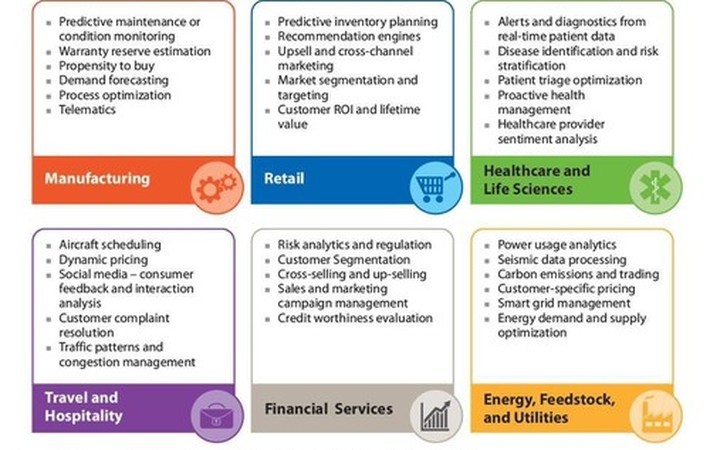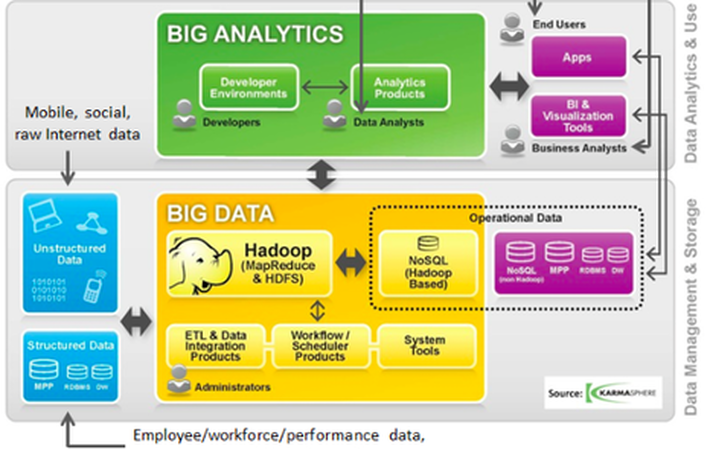
Published on 01/17/2017 | Technology
Drowning in a sea of digital oil
This is the IoT data-cycle: acquire-accumulate-organize-analyze-inform-act. Where is the weak link today? Analysis.
We are acquiring, accumulating and to some extent organizing vast amounts of data. And we are acting on that data in simple M2M use cases. But, as Glen Cathey or Cathey Advisor Group emphasizes, "the latent power of data lies in the ability to draw actionable insights." Our ability to transform data into meaningful information remains in beta mode.
As companies connect their operations to the cloud they absorb a deluge of data. This data sits in storage like oil without a refinery. We all know there's value but we can't extract it. And storage has a cost.
Traditional data science relies on human logic applied to structured data. This model is obsolete in a world of unstructured, heterogenous datasets. Machine learning applies generic principles on a vast scale to extract meaning from the mess. A computer vision program, for example, does not need to be programmed to recognize a cancer cell. It simply needs a feedback loop to identify success or failure and a horde of data to practice with.
Healthcare is turning to machine learning to power IIoT initiatives. Mercy Hospital saved $14 million in FY 2016 by using machine learning to pinpoint variations in patient background to reduce mortality, morbidity and length of stay. And nobody likes mortality.
We will undoubtedly see many things connected to the Internet in 2017. But until we close the loop by adding robust analysis into the data-cycle will still be operating like an oil company without a refinery.

The evolving CIO
The CIO of 2000 was a technologist. The CIO of 2020 will be a businessman (or woman). The role is shifting from maintaining IT systems to leading business transformation through the use of data.
A recent study by IoT Analytics found the following:
- Industrial analytics will be necessary for business success by 2020 (says 69% of businesses).
- The top 3 applications of Industrial Analytics over the next 3 years are Prescriptive Maintenance of Machines (79%), Customer/Marketing Analytics (77%), and In-field product usage analysis (76%).
- Only 22% of industrial businesses have the required data science skill sets.
What does this tell us...? Future profitability and growth will require use of data to drive decisions and optimize processes across every function, from product development to production to sales. But traditional businesses lack the data scientists necessary to execute this future.
IoT ONE features 535 vendors providing Data Analytics solutions, out of which only 50% of these vendors sell primarily to IT departments. The others are selling data solutions directly to operational departments. This is a new and important trends.
We built it! Now how do we sell it...?
Business model innovation has been acclaimed as a hallmark of the IIoT. But what we are really seeing is business model experimentation.
Only the market can decide when experiment translates into successful innovation. Will the 'asset-as-a-service' offer trump the lease, the sale, or the service? The market has yet to speak.
SafeGraph CEO, Auren Hoffman, believes that there are 3 different types of machine learning companies: the Super Rich, the Services, and the Innovators. The Super Rich do machine learning on their own data (think Google). The Servicers do machine learning on other people’s data (think GE). And the Innovators need to beg for access to data in order to do machine learning (think of every startup you know).
Innovators are the most likely to innovate radical business models because of the volume and fearlessness of their experimentation. After all, startups don't have legacy businesses to canibalize or brand equity to burn.
IoT technologies are ready to apply to the use cases below. Our next challenge - find the winning business model.
Meet your new colleague, Ms. Ai, she'll be replacing you
I bet you think you're smart. Irreplaceable perhaps? Unless you're a priest in the clergy don't bet on it.
In 2016, IBM's Watson took over the jobs of thirty-four analysts at Japan's Fukoku Mutual Life Insurance by applying an AI system to calculate insurance payouts. Fukoku expects to increase productivity by 30% and save $1.2m per year. The thirty-four analysts expect to be welcoming you to the unemployment ranks soon.
Boston Consulting Group predicts that 25% of todays jobs will be replaced by AI and robots by 2025. Oxford University ups the ante to 1 in 3 jobs facing extinction.
Of course, the job landscape is constantly in flux as technology changes. The number of secretaries in the world has halved as professionals outsource administrative tasks to software. The same happened to wagon drivers in the early 1900s following the advent of affordable cars.
This industrial revolution might be different. It's not just our muscle that's being replaced, it's our minds.
The Obama White House emphasizes education to help our kids survive in an increasingly AI-driven economy. The Trump White House will likely emphasize immigration controls and trade barriers to protect domestic jobs.
I'm not convinced either tactic will work for most Americans. And they certainly won't provide jobs for the world's 8.1 billion inhabitants circa 2025. How many athletic trainers, CEOs and clergy do we need?
Industrial IoT Thought Leadership
Internet of Things: Designing Smart Villages
~70% of India's population still lives in villages and problems faced by villagers go unnoticed as solutions are designed in an urban context. IoT-based solutions for villagers can be classified into 4 categories: Home, food, people, conservation.
IoT Future of Building Automation
New metrics will evolve using IoT-measured variables from our building data, such as well-being, satisfaction, stress and contribution to corporate purpose.
"Could IoT in general or the Industrial Internet of Things (IIoT) replace SCADA?" The answer, of course, is a definite no, but a little bit of yes, and it depends on your perspective.